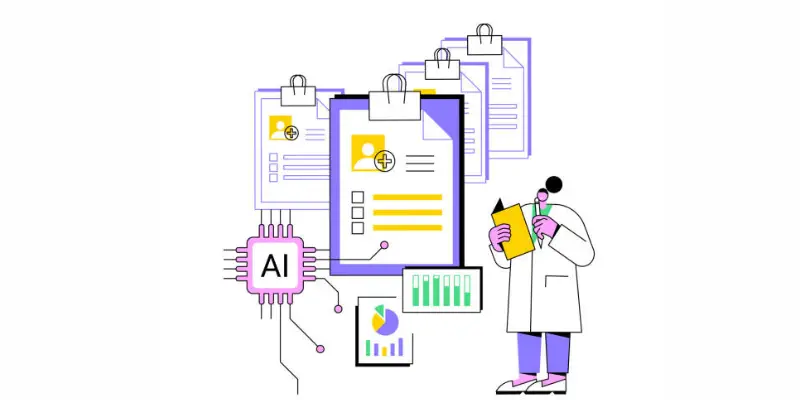Understanding the Role of AI in care With Examples of AI in Nursing
Published: 27 Apr 2025
Artificial Intelligence is revolutionizing healthcare by making tasks easier and improving patient care. In nursing, AI is not about replacing nurses but supporting them. It helps with monitoring patient health, reducing errors and managing workloads. As Dr. Eric Topol, a leading cardiologist and founder of the Scripps Research Translational Institute, said:
“The greatest opportunity offered by AI is not reducing errors or workloads, or even curing cancer: it is the opportunity to restore the precious and time-honored connection and trust between patients and doctors.”
This means AI can help nurses spend more time with patients, focusing on care rather than paperwork. Let’s explore how AI is making a difference in nursing today with some mind blowing examples.

What is AI in Nursing?
Artificial Intelligence in nursing refers to the use of technology to assist nurses in their daily tasks, making their jobs easier and improving patient care. AI can analyze large amounts of health data, recognize patterns and provide valuable insights to help nurses make decisions. Think of AI as a tool that works alongside nurses and helps them manage their workload and improve efficiency.
Examples of AI in Nursing
AI is not an idea in healthcare anymore. There are a lot of case studies about AI in Healthcare in which AI has supported Doctors in every department of healthcare. In nursing it is also making a huge difference when it comes to providing faster and better care. Let’s look at some of the most common examples where AI with nursing in action today.
A). AI-Powered Virtual Nurses
AI-powered virtual nurses are medical AI assistants that help patients manage their health by providing reminders, answering questions and offering health advice. These virtual nurses are available 24/7 and can make healthcare more accessible, especially for patients who need constant support. They can guide patients through daily care routines and help them stay on track with medications and follow-up appointments. Nurses can also use these tools to check in on patients remotely, saving valuable time.
- Provide medication reminders.
- Offer health advice and tips.
- Monitor patient health remotely.
- Improve patient engagement and satisfaction.
Real-World Example: Florence is an AI chatbot that reminds patients to take their medication and answers health-related questions. It’s like having a personal nurse in your phone, always available to help.
B). AI for Patient Monitoring
AI tools that monitor patient health in real-time are becoming essential in modern healthcare. These systems track vital signs like heart rate, blood pressure and oxygen levels, alerting nurses about any unusual readings. By using AI for patient monitoring, nurses can respond more quickly to changes in a patient’s condition, improving outcomes. This technology also reduces the risk of missing critical signals and makes patient care safer.
- Monitor vital signs like heart rate and blood pressure.
- Alert nurses about any abnormalities in patient data.
- Provide real-time updates on patient conditions.
- Help nurses act faster in emergency situations.
Example: An AI-powered monitoring system tracks a patient’s vital signs and sends immediate alerts to nurses if something is wrong, such as a sudden drop in oxygen levels.
C). AI in Predicting Patient Needs
AI can predict a patient’s future needs by analyzing their health data and identifying patterns. This helps nurses anticipate potential problems such as infections or complications far before they happen. By predicting these needs, AI supports proactive care and prevents emergencies. This can lead to quicker interventions and more personalized care plans.
- Analyze patient data for early signs of issues.
- Predict risks such as infections, falls or complications.
- Help nurses plan care ahead of time.
- Improve patient outcomes by preventing problems.
Example: AI can predict which patients are most at risk for infections and help nurses take preventive steps, like starting early treatment or increasing monitoring.
Also Read: AI Companies in Patient Engagement
D). AI for Documenting Patient Data
AI technology can help nurses save time by automating the process of documenting patient data. With AI tools like speech recognition, nurses can dictate notes instead of typing them out which is faster and more accurate. These systems also organize patient information automatically and reduce the chance of errors. By cutting down on time spent on paperwork, nurses can focus more on direct patient care.
- Automate patient data entry through speech recognition.
- Organize patient information quickly and accurately.
- Reduce time spent on documentation tasks.
- Minimize the risk of human error in record-keeping.
Example: With speech-to-text software, nurses can simply speak into a device and the system will automatically transcribe their notes, thereby saving time on manual data entry.

Suggested Article: The Role of AI as Caregiver in Healthcare
E). AI for Drug Administration
AI in drug administration makes sure the right medication is given at the correct dosage and time. By scanning patient records and medication orders, AI systems can alert nurses about potential errors such as incorrect dosages or harmful drug interactions. This prevents medication mistakes and improves patient safety. AI also tracks medication schedules, ensuring that patients receive their treatment on time.
- Verify correct medication and dosage.
- Alert nurses to drug interactions or allergies.
- Track patient medication schedules.
- Prevent medication administration errors.
Example: An AI-powered medication cart checks the patient’s records before a nurse administers the drug, verifying the correct medication and dosage and alerting the nurse to any discrepancies.
F). AI for Early Detection of Health Risks
AI tools can analyze large amounts of patient data to identify early warning signs of health problems. These systems track a patient’s history, monitor vital signs and even predict risks such as the likelihood of a heart attack or stroke. Nurses can then act quickly to prevent potential health issues from escalating into emergencies.
- Monitors real-time data and predicts health risks.
- Alerts nurses of potential health issues before they become critical.
- Helps in proactive treatment and care plans.
- Improves early intervention and reduces hospital readmissions.
Real-World Example: EarlySense is an AI-powered monitoring system that continuously tracks patient vitals and alerts nurses if a patient’s condition worsens, enabling early interventions.
G). AI for Personalized Medication Management
AI helps the nurses to track and manage medications more effectively by predicting the right dosages based on a patient’s condition, medical history and other factors. This personalized approach can improve patient safety and reduce the risk of medication errors.
- Provides personalized medication dosages based on patient history.
- Alerts nurses to potential drug interactions or allergies.
- Reduces the chances of medication errors.
- Improves patient compliance by sending reminders.
Real-World Example: The IBM Watson for Oncology system uses AI to suggest the most effective cancer treatment plans based on individual patient data and past treatment outcomes.
H). AI-Powered Chatbots for Patient Support
AI chatbots are being used to provide patient education and support. These virtual assistants can answer questions, guide patients through their care routines and offer 24/7 support, freeing up nurses to focus on more critical tasks.
- Answers patient questions in real-time.
- Provides educational resources for patients.
- Enhances patient engagement and satisfaction.
- Reduces the burden on nurses for non-medical queries.
Real-World Example: MediSprout is an AI chatbot that helps patients manage chronic conditions by answering questions and providing daily health tips, reducing the workload for nurses.

I). AI-Assisted Surgery and Recovery
Nurses assist during surgeries and the recovery process. AI is now helping in surgery by providing real-time guidance to surgeons. Additionally, AI systems monitor recovery progress which helps the nurses in tracking and improving patient post recovery outcomes.
- Assists surgeons with real-time data during operations.
- Monitors patient recovery to detect complications early.
- Helps in planning post-operative care more effectively.
- Improves the accuracy of surgical procedures and recovery plans.
Real-World Example: The da Vinci Surgical System uses AI to assist surgeons during robotic surgeries, offering precision and control while nurses help with patient recovery post-operation.
Advantages and Disadvantages of AI in Nursing
AI in nursing has the potential to transform patient care by making processes faster, safer and more efficient. While AI can assist nurses by automating tasks and providing real-time insights, there are some challenges to consider. It’s important to understand both the benefits and drawbacks of using AI in nursing to see how it impacts the healthcare system. Let’s explore the main advantages and disadvantages of AI in nursing.
Advantages of AI in Nursing
Here are the Advantages;
- Improves Efficiency: AI helps the nurses to save time by automating routine tasks like documentation, allowing them to focus more on patient care.
- Reduces Human Error: By checking medication orders and vital signs, AI prevents mistakes and makes patient care safer.
- Supports Decision Making: AI analyzes patient data and helps nurses make faster, more informed decisions about treatment plans.
- Enhances Patient Monitoring: AI tools can monitor patient health in real-time, alerting nurses to any issues before they become serious.
- Improves Patient Outcomes: With predictive AI, nurses can prevent complications by acting early, leading to better recovery and fewer emergencies.
- Personalized Care: AI assists to customize care plans for individual patients by analyzing their unique data and predicting what interventions will be most effective.
Disadvantages of AI in Nursing
Here are the Disadvantages;
- Dependence on Technology: Over-reliance on AI may lead to issues if systems fail or give incorrect information and nurses may lack confidence in their own judgment.
- Privacy Concerns: Patient data used by AI tools must be protected to prevent breaches and ensure confidentiality. There is also the risk of data misuse or unauthorized access.
- Training Requirements: Nurses need proper training to use AI tools effectively which can take time and resources. Some may also feel overwhelmed by technology.
- Limited Human Interaction: AI can’t replace the personal connection between nurses and patients which is essential for care. The emotional support nurses provide is irreplaceable.
- High Costs: Implementing AI tools can be expensive, especially for smaller healthcare facilities with limited budgets. The cost of AI infrastructure may also divert funds from other critical areas.
- Bias in AI Algorithms: If not properly designed, AI systems could reinforce biases present in training data, leading to inaccurate conclusions or unfair treatment.
Final Thoughts
AI is already making waves in nursing, improving efficiency, patient care and safety. While there are challenges to overcome, the potential for positive change is clear. These examples of AI in nursing show just how much AI can support nurses in their everyday tasks and permits them to focus more on patient-centered care. As AI technology continues to evolve, it will likely become an even bigger part of the nursing profession.
The future of nursing is exciting and AI is a major part of that future. We encourage you to dive deeper into the examples of AI in nursing to discover how these innovations can shape the healthcare industry and enhance patient outcomes. The possibilities are endless and by staying informed, you can be part of this transformative journey!
Related Questions and Answers
Here are frequently asked questions about AI in Nursing;
Most nursing AI tools are designed with user-friendly interfaces requiring minimal technical expertise. Hospitals typically provide training programs to help nurses become comfortable with new AI systems. The focus is on practical application rather than technical understanding of how the AI works.
No, AI is designed to assist nurses, not replace them. The human touch, emotional intelligence and critical thinking skills that nurses provide cannot be replicated by technology. AI handles routine tasks so nurses can focus more on direct patient care and complex decision-making.
Healthcare AI systems must comply with strict regulations like HIPAA to protect patient privacy. Data used by AI is typically encrypted and access is limited to authorized healthcare professionals. Regular security audits help in making sure patient information remains protected from unauthorized access.
Implementation costs vary widely from a few thousand dollars for simple AI chatbots to millions for comprehensive hospital-wide systems. Many facilities start with smaller AI implementations and scale up gradually. Some AI solutions offer subscription models that make costs more manageable for smaller healthcare providers.
Most patients respond positively to AI when they understand it’s enhancing their care rather than replacing human interaction. Clear communication about how AI is being used helps in building patient trust. Older patients may need more reassurance but often appreciate the benefits once they see how AI improves their care experience.
Many nursing schools are now incorporating AI education into their curricula. Hospitals frequently offer in-service training when implementing new AI tools. Online courses, webinars and certification programs specifically designed for healthcare professionals are becoming increasingly available.
Small clinics can start with cost-effective AI solutions like virtual nursing assistants or documentation tools. Cloud-based AI services often have lower initial investment costs than on-premise systems. Some AI vendors offer scaled pricing models specifically designed for smaller healthcare facilities.
Nurses should understand the potential for AI bias and work to ensure fair treatment for all patients. It’s important to maintain human oversight of AI recommendations and not blindly follow algorithmic suggestions. Nurses also have a responsibility to advocate for proper AI use that respects patient autonomy and privacy.
By automating routine tasks and paperwork, AI can significantly reduce the administrative burden that contributes to burnout. Studies show that nurses who use AI tools often report higher job satisfaction and less stress. However, poorly implemented AI that creates technology frustration can potentially worsen burnout if not properly managed.
Yes, the initial cost of implementing AI technology can be high, especially for smaller healthcare facilities. However, the long-term benefits such as improved efficiency and better patient care often outweigh the costs. Many hospitals are finding that the investment pays off over time.





